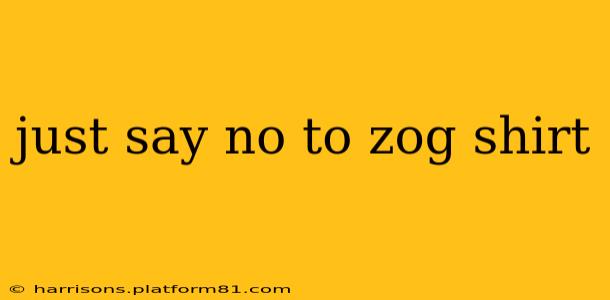Just Say No to ZOG: Understanding the Symbol and Its Meaning
The phrase "Just Say No to ZOG" and the accompanying imagery are frequently encountered within certain online communities, primarily associated with extremist and antisemitic groups. Understanding the meaning and implications of this slogan is crucial to combating the spread of hateful ideologies. This isn't about censoring speech; it's about understanding the hateful nature of this symbol and its dangerous implications.
What does ZOG stand for?
ZOG is an acronym that stands for "Zionist Occupation Government." It's a conspiracy theory alleging that a secret cabal of Jewish people secretly controls global governments and institutions. This deeply rooted antisemitic trope frames Jewish people as malevolent puppeteers manipulating world events for their own nefarious purposes. The term is often used to incite hatred and violence against Jewish communities.
Why is "Just Say No to ZOG" harmful?
The seemingly simple phrase "Just Say No to ZOG" is a dog whistle, a coded message understood by those within the extremist communities but easily dismissed by those unfamiliar with the hateful ideology it represents. It subtly propagates a dangerous conspiracy theory that fuels antisemitism and has historically led to violence against Jewish people. The phrase, therefore, isn't just a statement; it's a call to action within a specific, harmful ideological context.
What are the origins of the ZOG conspiracy theory?
The roots of the ZOG conspiracy theory can be traced back to centuries-old antisemitic tropes that depict Jewish people as controlling global finance and power. This imagery has been resurrected and amplified by modern extremist groups who utilize online platforms to spread their hateful messages. The conspiracy feeds on existing prejudice and fear, utilizing readily available online spaces to cultivate a sense of shared identity amongst like-minded individuals.
How can we combat the spread of this hateful ideology?
Combating the spread of antisemitic tropes like the "ZOG" conspiracy theory requires a multifaceted approach:
-
Education: Educating individuals about the historical context and inherent dangers of antisemitic ideologies is paramount. Understanding the symbolism and the underlying motivations behind such hateful rhetoric is crucial to effectively counter it.
-
Critical Thinking: Encouraging critical thinking skills allows individuals to better identify and assess the validity of information encountered online. This includes verifying sources and being wary of unsubstantiated claims.
-
Platform Accountability: Holding online platforms accountable for the content they host is critical. This includes implementing effective strategies to identify and remove hateful content that promotes violence and discrimination.
-
Community Building: Building strong, resilient communities that actively reject hatred and intolerance is essential. This involves creating spaces where open dialogue and understanding can flourish.
In conclusion, "Just Say No to ZOG" is not a harmless expression. It is a dangerous symbol deeply rooted in antisemitism and should be understood and rejected for what it is: a hateful message that promotes discrimination and violence. Active engagement in combating this ideology, through education, critical thinking, and community building, is essential for a more just and equitable society.
